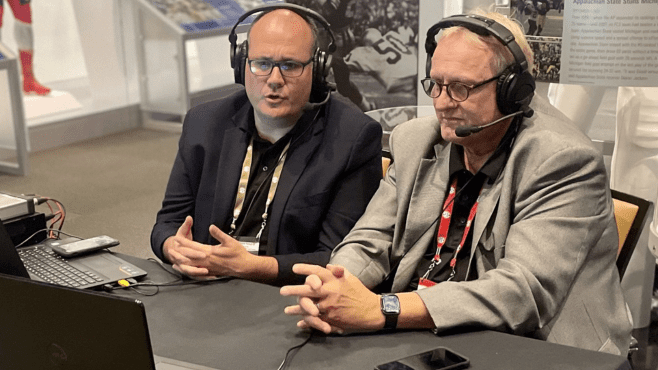
By JOHN JAMES MARSHALL
Written for the LSWA
He was a tagalong, only eight years at the time, but the kid had a fascination with all of the things a newsroom had to offer in the 1960s.
The cigar smoke. The pounding of the typewriter. The clicking of the teletype machine. Most of all, the chatter.
Grown men talking about grown men stuff.
“I’d sit there with my dad and all the sports writers,” he says today, “and just take everything in.”
Until one day when Bud Montet, then the sports editor of the Baton Rouge Morning Advocate, called the kid over and handed him a few pieces of paper. “Can you write me four or five paragraphs on this BREC softball game?” Montet asked.
And the boy set about that task on a manual typewriter, two fingers hunting-and-pecking all the way, with the mission of crafting the best BREC softball game story that has ever been written by an eight-year-old.
“I knew then,” Ron Higgins says today, “that this is what I wanted to do.”
It has carried him into the Louisiana Sports Hall of Fame as a 2024 recipient of the Distinguished Service Award in Sports Journalism. He is part of the 12-member Class of 2024 to be honored June 20-22 in Natchitoches. For participation opportunities, visit LaSportsHall.com or call 318-238-4255.
***
Appropriately, there is a story about how Higgins got started as a sports writer because stories are what he is all about.
Though he still uses that hunt-and-peck style he learned as an eight-year-old, Higgins doesn’t write with his fingers.
He writes with his eyes.
He writes with his ears.
And he writes with his heart.
(His fingers just do the dirty work).
There are stories about covering games all over the South, stories about interview subjects that nobody else had ever heard of and stories about situations he just happened to walk into. But before you can read it, first he had to see it. Hear it. Feel it.
In a 45-year career that has included an amazing 11 stops along the way, Higgins still has a hard time deciding what he enjoys the most about covering sports.
Maybe it’s the big games. Or the off-the-wall quotes. Or giving a hard-line opinion when the situation calls for it. Or the below-the-radar feature stories that he finds that nobody else seems to.
“I have always loved a long-form feature,” he says. “But then again, I like the immediacy of a really good game story. I love covering events because you never know what’s going to happen in a game. That’s the beauty of it and you get to write it that way. And I like writing columns because I’m opinionated. When you’ve done it as long as I have, you’ve got a pretty good perspective. I wish I had that perspective about 30 or 40 years ago.”
Maybe even longer than that.
Higgins had bylined stories before he had a driver’s license. (“Mother would drop me off at the games and come back and pick me up,” he says.) He’d go into postgame locker rooms and football coaches thought he was the towel boy.
There’s no mistaking it any more. Higgins is going to be in the Louisiana Sports Hall of Fame, alongside sports and sportswriting heroes from his youth, and throughout his career.
“Even after they told me, I had a hard time believing it,” Higgins says. “There are so many other people in this state, which has had a history of great writers, that I think deserve it more. But I’m truly honored to be selected. It’s been my life’s work. It’s all I’ve wanted to do since I was a boy.”
***
You want stories? Let’s begin.
On Jan. 11, 1980, Higgins had a morning appointment to talk to LSU defensive coordinator Greg Williams. Fresh out of college as a 1979 LSU graduate, Higgins was working for Tiger Rag and didn’t bother to listen to TV or radio that morning as he made his way to the LSU football office.
When he arrived, he could instantly feel that something was wrong.
“I walked in and everybody is crying and I asked what happened,” Higgins remembers. “That’s when they told me Bo’s plane went down.”
Bo Rein, who had been hired only two months earlier, had left Shreveport the night before to return back to Baton Rouge after a recruiting trip and the plane he was on crashed in the Atlantic Ocean. (The cause of the crash was probably cabin depressurization causing a lack of oxygen.)
“I didn’t even know what to say at that point,” Higgins says. “I realized that I don’t think I can walk into anything worse than this.”
He explained that he had an appointment with Williams. He was told that Williams was in his office and, amazingly, had put Rein on the plane the night before in Shreveport.
Williams invited Higgins into his office. “All I asked him was ‘What happened?’” he says. “And he just started talking.”
Less than a year out of college and Higgins was listening to a man who had just lost one of his best friends and could have easily been aboard that plane had he not made other last-minute plans.
Not exactly a situation they teach you in a journalism classroom.
Higgins followed up with Williams, who had retired from coaching, for a reflective 2015 story that won first place in the LSWA’s annual writing contest.
Want another story?
In 2019, Higgins was working for NOLA.com and knew a personal trainer who had a story to tell about one of his clients.
Joe Este was a New Orleans kid who had come from a tough background, but had managed to get a football scholarship at Tennessee-Martin. Este discovered his mother was homeless, living out of a car in a casino parking lot. He also had two nephews that were basically orphans because Este’s sister had a drug addiction.
“He decided to raise those kids while playing football at Tennessee-Martin,” Higgins says. “He was 21 years old. Every day he raised those two boys and they became like the mascots of the football team. He managed to graduate, then got a shot with the (Tennessee) Titans and made it for about a month.”
Which was a nice story and made for a good video package on the 10 o’clock news. But Higgins’ story went beyond that.
“He wanted to adopt those kids but he didn’t know how,” he says. “When my story got printed, all these people, including lawyers, called me wanting to help him adopt the kids. Eventually, he did and has raised them as his sons.”
OK, one more …
When he was working in Memphis, Higgins went to the USA Olympic Baseball training facility in Millington, Tenn. “They had open tryouts,” Higgins says. “And anybody could try out.”
Anybody did … and his name was Lonnie Altman.
“I saw this guy playing shortstop with this old-time flannel uniform on,” Higgins says. “He was probably in his 40s. And he was awful.”
Altman was staying in a van in the parking lot. “His whole life was in the van,” says Higgins. “Even had a picture of his mother on the dashboard.”
So Higgins asked the obvious and not-so-subtle question: “Why are you even here?”
“My mother always wanted me to be a ball player,” Altman told him. “I know I’m not very good, but I wanted to make my mother proud.”
***
Higgins has worked for the more than one paper in the same city (Shreveport), twice in the same city (“I came back and replaced myself in Memphis,” he says), Mississippi, Alabama and all sorts of publications in Baton Rouge and New Orleans.
He’s seen a lot in journalism because there’s a lot to see. And not all of it is good, in his opinion.
“I’ve grudgingly tried not to adjust to new journalism,” he says. “I still believe in the value of a good story that’s not written in tweets. I still believe that people like to read really good stories. I can’t stand some of the fast-food, new journalism that you are forced to file now because your bosses believe you have to dumb things down to the readers.”
In 2008, he served as president of the Football Writers Association of America. He remains the only Louisiana native to hold that office.
Higgins is also a 10-time Tennessee Sportswriter of the Year. He was inducted into the Tennessee Sportswriters Hall of Fame in 2011.
He didn’t get those honors by writing stories titled “Three things you need to know about …”
“Everything is a list or five observations,” Higgins says. “They don’t believe people have time to read anything so they dumb it down as much as possible. I still believe there are literate people out there who like to read good stories. When you come across a really good story to tell and you know it’s going to come across that way, it kind of renews your faith in what you’re doing.”
And don’t get him started about the limited media access. Gone, for the most part, are the days of interviews in front of a player’s locker.
“The access is awful, Higgins says. “There is no access and that’s what you miss. Some of the greatest quotes you ever get are in locker rooms because they weren’t on a platform and they weren’t in front of a bunch of cameras. There wasn’t a moderator asking questions and it wasn’t controlled because your coach wasn’t sitting next to you.”
***
And the reason why that young boy was in smoke-filled newsrooms back in the 1960s? That’s because the Ron’s father was Ace Higgins, who was the longtime Sports Information Director at LSU.
In those days, Ace Higgins would come to the Morning Advocate newsroom three times a week and help write stories to put the sports section together.
But Ace Higgins was much more than that. He was the school’s SID when Billy Cannon won the Heisman Trophy. And when LSU had 13 first-team All-Americans. And when Pete Maravich showed up and changed the way college basketball was played.
Three days before Christmas in 1968, Ace Higgins died of a heart attack. He was 45 and left behind a 12-year-old son.
“I think about him every day,” Ron Higgins says. “Every press box I go in, there is somebody who knew him and they’ll talk to me about him.”
When Higgins was hired by the Shreveport Journal in December 1982, the second column he wrote was a tribute to his father, Ace.
“My dad never intended for me to be a sportswriter,” Higgins says. “So he never really knew how much influence he had on me.”
Or how much influence his son would have in a career of telling stories.
John James Marshall is a former LSWA president who writes for the ShreveportBossierJournal.com.

